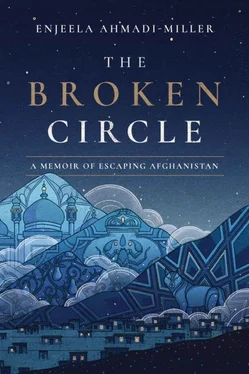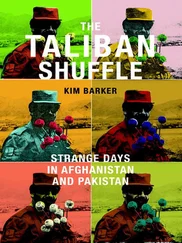“The Russians are taking over the city!” he yelled at me. “You can’t go outside anymore.” I followed him around the house, locking doors and windows. He quickly explained to me that the machines were Soviet tanks and those were Soviet soldiers. They had invaded our country. Fighting had erupted across the provinces of Afghanistan, and now the war had arrived at our gates. For so long, Padar had made it sound as if we would always be safe inside our home; it wasn’t possible that war could come so close. Noor deeply feared the Soviets, and his fear seeped into me, and we rushed to secure the house. The way he spoke of them as invaders, they seemed unpredictable. I didn’t leave Noor’s side the rest of the day. When he went into the kitchen to cook, I climbed on the counter and watched him, trying not to shake from the thought of being so close to the war happening just outside our home.
When my sisters and brothers returned from school, they had passed by the tanks in the street and couldn’t stop talking about the soldiers everywhere. The Soviets had surrounded the schools and important buildings in town and had flooded the streets with checkpoints and inspections.
At dinner Padar told us that we should stay inside for a few days, which meant the older kids would not be going to school. If the students started protesting again, there would be more shooting. It would take a few days for everything to calm down.
A few nights later, Padar turned on the radio in the living room, and we gathered around. The new president, Babrak Karmal, gave a speech explaining that the Russians had come to the rescue of their Afghan friends. That was the first time I had heard of the mujahideen, the freedom fighters in the mountains. Padar loved Afghanistan. He had taught us songs and poems about our country, that it was our motherland, a sacred land that no one could drive us from. He had read to us stories of how Afghan fighters had defeated the British and a whole parade of invaders. And now the Russians with their tanks and machine guns had invaded to do what he believed could never be accomplished. The Soviets had taken over the government and forced the Afghan army to fight with it against the mujahideen, who were primarily conservative, traditional folk of the countryside.
He doubted that the Parcham government would ever be able to carry out their socialist agenda for the country. They could not confiscate the land from every large landowner for their redistribution plans. He sat rigid and wide-eyed, listening in a sullen silence, moving only to take handsome gulps of his Scotch. By this time, we all knew what this meant for him—his land, his houses, his years of hard work and saving and investing would be stolen from him by this government.
The rattle of war, of guns, bombs, and tanks rumbling over pavement, became a nightly occurrence. I was now afraid to sleep alone, so I went to Laila’s room. When Zia and Zulaikha couldn’t sleep, we’d all end up there. The sounds of chaos outside went on for a few days, and then, as Padar had predicted, it died down.
Padar went back to work. But we stayed home. We played card games, told jokes and stories, and tried not to think about what was happening around us.
“Do you think Mommy’s ever coming back?” I asked Laila.
“Not with all this fighting going on.”
Zulaikha didn’t say anything.
“Why do you think she left without us?” I asked.
Zulaikha shrugged. “Does it matter?”
“Are you guys going to play?” Zia asked, throwing down a card.
Zulaikha was so quiet; she rarely shared her thoughts, but it surprised me that she didn’t seem to care that our mother had left with no notes or calls to any of her other children. Since she had left, our once well-ordered life had fallen to pieces—no one except Padar could tell us what to do. We didn’t listen to the maids or even Noor when they told us to clean up. We took showers when we wanted to, and no one did their homework. We ate well, but only because of Noor. For the first couple of weeks, we fought over everything: who had won a certain game, who was the best at cards, who would go and fetch food from the kitchen. Even soft-spoken Zulaikha and her closest sister, Laila, got into a fistfight. Zia had to step between them. We stayed up as late as we wanted and rose when we wanted. Our rooms became desperate for a cleaning.
“What if she didn’t want us anymore?” I asked.
Zulaikha gave me a curious look that said Why would you think that? “What if she didn’t have room on the plane?”
Shahnaz worked for the national airline. She could have helped us get tickets.
“Maybe she was tired of all the questions you ask,” Zia said, throwing down another card and nodding at Laila to take a turn.
“Maybe you’re too sloppy,” Laila said, half smiling.
“Your room is a cesspool,” Zia said, trying to hide a smirk. “I can smell it from a thousand miles away.”
“Your fingernails are always dirty, and you’re a tomboy,” Laila said. “You know how she wants everything to be perfectly clean.”
“Padar will take us to Mommy,” Zulaikha said, always one to take a serious bent.
“But he won’t leave here, ever,” I said.
“Well, if you know everything already,” Laila said, tossing all her cards on the floor, “then you tell us why she left us behind.”
Laila glared at me, waiting. Zia laughed, trying to lighten the mood.
“All right,” he said. “Mommy will return, or we will go to her. Either way you will both be right. Can we play now?”
Laila picked up her cards and bit the inside of her cheek as she pondered her hand. I thought of many reasons why Mommy could have left them behind too. Zia and his messy bedroom and his reluctance to shower. And Laila and her single-minded focus on a game, even if she’d been called a hundred times to dinner. But under the smirks and humor, a well of fear bubbled up—what if they were right about why Mommy left?

One night the electricity went off, and it didn’t come back on for several days. Noor cooked dinner over a fire in the yard, and we ate in the dark. As the blackouts become more frequent, so did our use of kerosene lanterns that Padar had found. Noor went to the market each day to buy food. He always came back exasperated with the soldiers, who dominated the streets. He feared the shopkeepers would just up and close. Everyone seemed to talk under their breath out of fear of being overheard by the secret police or the Soviet soldiers. Noor said there were far fewer people in the city; many people had fled to rural areas or had left the country.
Padar would never leave, and Mommy would never return to a nation at war. I used to daydream that she would suddenly appear to rescue us. But with every day that passed, she became less clear in my memory; at times I could see only a mere outline, though I could hear her voice. Even when I tried to listen for her in my head, the familiar firm sharpness of her words would be drowned out by the sounds of tanks, gunfire, and trucks full of grim-faced soldiers. I wondered if I would even recognize her if she came to the door.
I spent many days up in the pear tree, watching the tanks and jeeps and soldiers passing by. Planes streaked low across the sky; the rumble of their engines made my legs shake.
The government wanted to turn Afghan society into a socialist state overnight, wiping away centuries of religious thinking and tradition. They had already changed the textbooks in all the schools, taking out any reference to Muslim faith. They even changed the national pledge that each child recited every morning to include loyalty to the socialist state of Afghanistan. They arrested the popular teachers, administrators, and professors who refused to change. These purges and demands only fueled the discontent of the people, which spilled over into protest. Kabul settled into a state of unrest, with its citizens constantly taking to the street in active revolt. Kabuli students passed out flyers about the planned marches, and people from outlying villages poured into the city to show their solidarity. Shopkeepers closed their stores. The marches were meant to be peaceful, Padar told us at dinnertime. But they were shouting slogans denouncing the Parcham and their socialist agenda, so the soldiers fired on the crowds. People were being killed. After the violence escalated, the protests spread to the high schools.
Читать дальше













